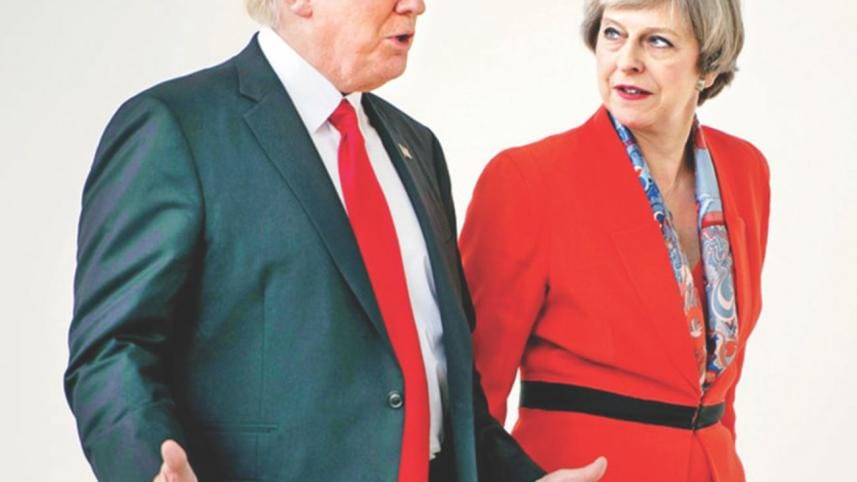The West's Crisis of Confidence

In an age defined by US President Donald Trump's rage, Russian President Vladimir Putin's revisionism, and Chinese President Xi Jinping's unbridled ambition, the international order is becoming increasingly disorderly, dysfunctional, and even dangerous. How did we arrive at this state of affairs? And how can we leave it behind?
Until recently, the era following World War II was a time of benevolent liberal internationalism. The postwar order had begun to take shape as early as 1941, when US President Franklin D Roosevelt and British Prime Minister Winston Churchill drafted the Atlantic Charter on a ship anchored in Canada's Placentia Bay. Though Hitler had been victorious on the battlefields of Europe, Churchill and Roosevelt were determined not only to defeat the Nazi onslaught, but also to lay the groundwork for a future of peace and democracy.
They succeeded beyond what they probably imagined was possible. After the Atlantic Charter came the United Nations, the Bretton Woods institutions, the global trade system, the Universal Declaration of Human Rights, and much more. During the postwar decades of decolonisation, many new countries emerged, and former enemies united under new alliances and an overarching structure of integration.
China's great "opening up" and the Soviet Union's collapse in 1991 marked the start of a quarter-century of truly remarkable global progress. In fact, judging by standard economic, political, and social indicators, it might well have been the best quarter-century in human history. There were no major wars between superpowers, global trade expanded and drove economic growth, poverty was more than halved, and rapid advances in science and technology delivered benefits to every corner of the world.
In recent years, however, the world has entered a new phase. The politics of idealism and hope have been replaced by the politics of identity and fear. This trend took root in one Western country after another, but its most notable manifestations have been in the two Anglo-Saxon countries that made the previous period of miraculous progress possible in the first place.
Today, the confused political debates in the United Kingdom are tragic to behold. Since the June 2016 Brexit referendum, Britain has searched in vain for an illusory concept of sovereignty that might prevent the massive loss of international power and influence that awaits it after its departure from the European Union. The kind of global statesmanship that the UK once offered the world has given way to parochial bickering.
But the confused politics of Trump's White House are of even greater consequence. For decades, the White House was a font of global leadership; today, it is a source of belligerent rhetoric that does not even pay lip service to the idea of a global order. Indeed, the Trump administration's official National Security Strategy portrays US efforts to safeguard the global order as counterproductive and self-defeating. The future it envisions will be defined wholly by conflicts between sovereign countries.
Revisions to America's strategic posture would be a reasonable response to Russian aggression and rule-breaking, particularly in Eastern Europe, and to China's growing assertiveness on the world stage. But the US president's first instinct should be to defend the international order against rising threats, while making adjustments to account for new realities. Addressing climate change, increased migration, and the revolution in information and communication technologies (ICT) will require new, comprehensive international agreements to protect the interests of sovereign countries.
Sadly, the pronouncements from Trump's White House seem to be aimed at undermining any sense of order, with the hope that the US will come out on top in some future Hobbesian struggle for total global dominance. By this logic, international trade should be regulated not by rules and institutions, but through unilateral protectionist measures and arm-twisting. And institutions like the EU—which aims to ensure order and stability through integration—are treated with indifference, if not disdain.
From China's perspective, the Trump administration's Hobbesian vision could prove appealing, provided that its economy continues to grow, and that it avoids serious domestic social or political upheaval. After all, with fewer global rules, China will face even fewer obstacles when asserting its growing influence abroad.
In this scenario, the loser would undoubtedly be the wider West, meaning not just Europe but countries like India, which will remain committed to liberal democracy, economic openness, and the values underpinning that miraculous quarter-century after the Cold War.
Even barring worst-case scenarios, the West will be facing a new world with new aspirants making new demands about the future. It would thus be a fateful mistake for Western powers to abandon the ideas and institutions that delivered prosperity and stability in previous decades. Above all, the two countries most responsible for creating the postwar international order must not turn their backs on it now.
Carl Bildt is a former prime minister and foreign minister of Sweden.
Copyright: Project Syndicate, 2018.
www.project-syndicate.org
(Exclusive to The Daily Star)

Comments